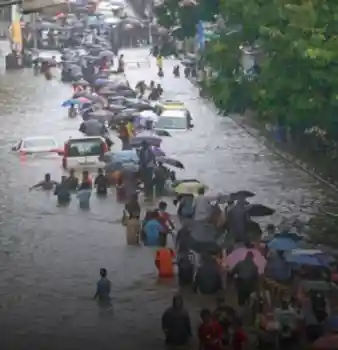
Understanding the underlying causes of the
intense rainfall and flooding that besieged Mumbai in August 2020 is paramount
for devising effective mitigation strategies. Meteorologically, the city
experienced an unprecedented deluge, with rainfall exceeding 944 mm in just 48
hours, shattering previous records. Contributing to this deluge were factors
such as the influence of the southwest monsoon and atmospheric conditions
conducive to heavy rainfall. Urban planning issues exacerbated the situation,
with Mumbai's rapid and unplanned expansion leading to widespread construction
on wetlands and natural drainage channels, impeding the flow of water and
exacerbating flooding. Furthermore, inadequate stormwater drainage systems and
insufficient maintenance of existing infrastructure further compounded the
problem. By delving into these meteorological and urban planning factors, we
can gain crucial insights into the root causes of Mumbai's vulnerability to
flooding and pave the way for informed, proactive measures to safeguard the
city against future inundations.
After the devastating floods hit Mumbai in
August 2020, the city showed unmatched strength and solidarity in the face of
adversity, despite widespread violence and devastation, Mumbaikars came
together to offer a beacon of hope and support to it affected them. Communities
opened their doors to provide shelter, food and support for stranded
individuals, demonstrating the power of teamwork in times of crisis. Volunteer
groups and non-profit organizations immediately mobilized, organized relief
efforts, distributed essential supplies and helped in rescue operations,
government agencies initiated various projects to support recovery programs including
deploying emergency response teams, setting up relief camps and providing
financial assistance to affected households, and focused on the unwavering
spirit, to overcome adversity through solidarity and compassion the city on
acted as a testament to power by celebrating these examples of community
support, volunteerism and government intervention, we not only celebrate but
highlight the strengths of Mumbaikars also. the importance of collective action
in building a more resilient and compassionate society.
Mumbai’s 2020 floods served as a stark
reminder of the urgent need to make the city prepared for future floods. One of
the most important lessons from this disaster was the importance of
incorporating advanced technology into flood planning. Real-time monitoring
systems, forecasting models and early warning systems should enable authorities
to accurately predict flood risk and take proactive measures to mitigate its
impact Furthermore, city enhancement of planning practices is of utmost
importance to reduce Mumbai’s flood risk. This includes prioritizing
sustainable development, preserving natural drainage systems, and implementing
green solutions to increase abstraction and reduce runoff does community
participation also play an important role in building resilience to flooding.
Residents, community organizations, and feeder citizens within the federal
organization can collaborate on alternative preparedness initiatives, such as
disaster drills, flood drills, community recognition and interest in accepting
the whole of this text. A future state of water and disaster against adequately
protecting residents and infrastructure.
The devastating floods that hit Mumbai in
August 2020 are inextricably linked to the broader context of climate change,
highlighting the city’s vulnerability to future climate challenges According to
climate experts means that global warming contributes to increased temperature
And as the severity happens also F, rising sea levels pose a serious threat to
low-lying coastal cities like Mumbai, raising the risk of flooding will occur
as heavy rains and storms intensify As the impacts of climate change intensify,
Mumbai must adopt sustainable urban development practices that prioritize
resilience and adaptation. This includes revisiting land use plans, integrating
green features and strengthening coastal protection. The adoption of
anti-weather technologies such as permeable pavements and rainwater harvesting
can increase a municipality’s capacity to absorb and manage excess water
Government policies and community participation are equally important to
jointly promote sustainable urban development and climate change. By addressing
these issues, Mumbai can position itself to meet the challenges posed by
climate change and provide a more resilient and sustainable future for its
residents.
In conclusion, the August 2020 floods in
Mumbai are a sobering reminder of the urgent need for a comprehensive response
to address the city’s vulnerability to extreme weather and climate change
Required. This requires integrating advanced technologies, prioritizing
sustainable urban development, encouraging community engagement, and
acknowledging the broader context of climate change Through the efforts of
government officials, communities and on top of stakeholders, Mumbai can
develop a robust and sustainable strategy that is constantly dealing with the
consequences of urbanization and climate variations and Lessons learned from
the 2020 floods through providing valuable insights into complex and adaptable
urban landscapes.